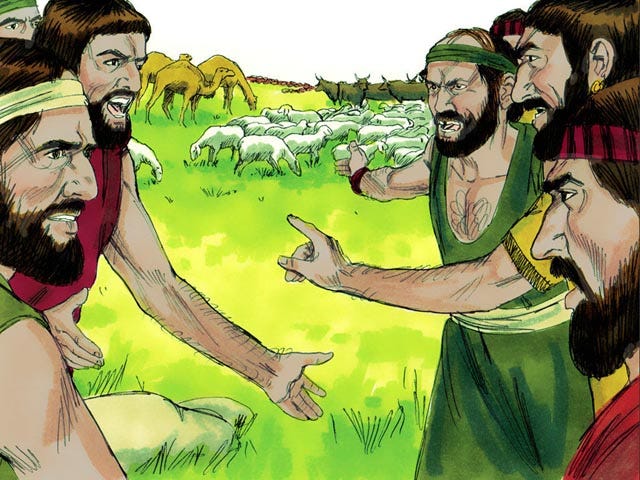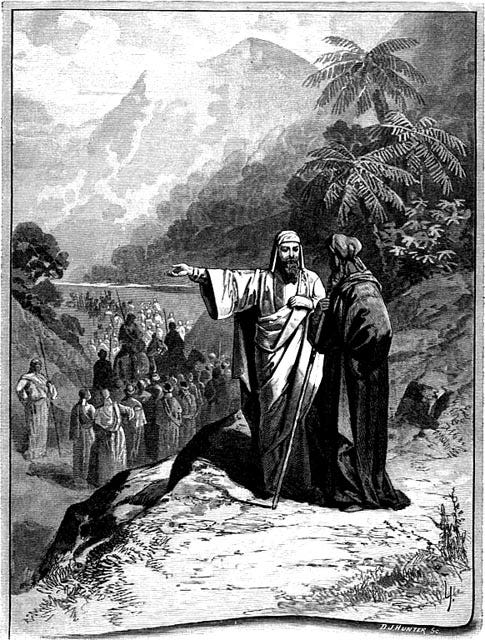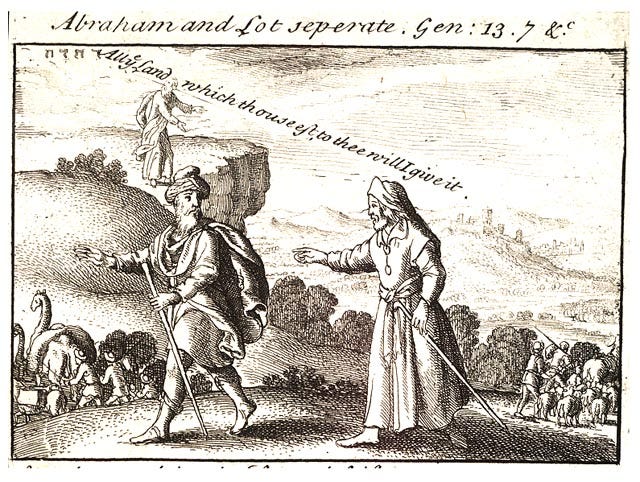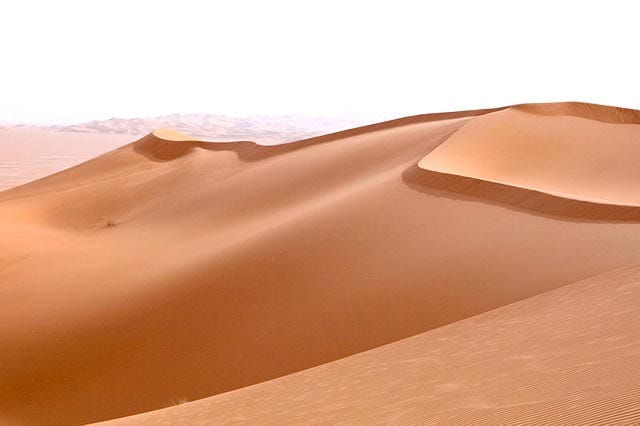Genesis 13 - Abram and Lot Separate
"This Promised Land ain't big enough for the both of us!"
Well, this is one of those short chapters where nothing much happens, like an episode of a show where the story doesn't really move forward, but they're laying foundations for future episodes. (A couple of my usual sources don't even mention this chapter at all.)
The Story
Abram was now rich with the booty he had scored from the Egyptians. So he and his entourage left Egypt and headed for the southern part of what is now Israel (sort of). He then went from the south up to Bethel, where he had camped and set up an altar before heading for Egypt (see the lesson on Genesis 12).

The "cowboys" get ready to rumble. (Sweet Publishing)
Now, Abram and Lot had so much stuff between them that the land where they lived together couldn't hold it all. On top of that, their "cowboys" (herdsmen) were picking fights with each other, presumably over available pastureland. ("This Promised Land ain't big enough for the both of us!") The situation was further aggravated by the fact that they were sort of squatting in hostile territory (surrounded by "Canaanites and Perizzites"--oh my!). So Abram suggested they split up, and gave Lot first pick of where to go.
Lot took the Jordan Plain, a place as lush as Egypt had been (I guess the drought was over). That left Canaan for Abram. As a sort of teaser, we're reminded what's going to happen at Sodom and Gomorrah, where the men "were wicked and sinned greatly."
Even though Lot chose first, the god told Abram that the land he was stuck with would belong to his descendants forever, and that the descendants themselves would be numerous as dust; although that must be a finite number, I'm pretty sure Abram's descendants haven't reached it yet! (See below.)
Then Abram moved to Mamre.
The Great Separation
I love the humanity in this story of Abram and Lot's separation.
Imagine this extended family all living together, with their herds and their flocks and their staff and everything. Trouble was bound to happen.
And Abram, as a very human leader, comes up with a decent solution: Let's split up, he says. And being wise and all, he gives his nephew Lot first pick.
No religion here. No casting lots (hehe), no prayer meeting, no "can't we all just get along?" Just a very pragmatic split.

Abram (light) and Lot (dark) come to an agreement. (Wikipedia)
Note that Lot goes for what was at the time the richest-looking land, the best "deal": the plain of Jordan was "well watered," "like the garden of the LORD [and]... Egypt"--until, that is, the god literally rained down "brimstone and fire" on the place. But what Abram was left with was a stony, desert place, yet which seemed to serve just fine.
Some see in Lot's choice an indication of his selfish nature, he being the "lower" kind of man who is attracted by material things. (Note his dark apparel in the illustration above, like a bad guy's "black hat.") The noble, generous Abram is then the "good guy," the spiritual man who sees the potential in whatever the god gives him. This hints at a method of Biblical interpretation in which esoteric ideas (or at least psychological ones) are encoded in the Bible's stories.
In a similar vein, Abram trusted that the god would bless him, so he was happy to take whatever he got in the split; he was a man of faith, but Lot tried to hedge his bets by taking the richest land, not counting on the god to supply anything.
(But remember that neither of these guys owned the land they were on; that came later, for Abram/Abraham.)
The Promise Continues
And now, here comes the god stuff.
Reaffirming his promises in Chapter 12 ("great nation," "blessing," "land"), the god--in something of a hyperbolic expansion--says that Abram's descendants will be "as numerous as the dust of the earth." (The implication here is that Abram's portion was dusty, not "well-watered" like Lot's.)

Abraham and Lot separate (Wikipedia)
Now (surprisingly?) I could find no estimate of how many pieces of dust there are on the earth. But I did find a number for grains of sand on the beach, as estimated for a lark by researchers at the University of Hawaii. Very, very, very roughly, that number is
700,500,000,000,000,000,000
Now, according to the god, Abram's descendants are going to be more than that. I realize the counter hasn't stopped yet, so perhaps the number could be reached in millennia, but counting--not just Jews and Muslims, or even Jews, Muslims, and Christians, but all human beings--the total number of people who have ever lived has been estimated at
107,000,000,000
We can quibble over the definition of "human"--when did we start being human? do Neanderthals count? etc.--but the difference is so vast that no matter what we do, Abe's descendants have a long way to go to catch up to beach sand, let along particles of soil, house dust, and the 60 tons of cosmic dust that fall on the earth every 24 hours.
(By the way, the difference between sand grains and people who ever lived is 700,499,999,893,000,000,000. Not a small difference.)

Geez, we haven't even counted the grains in sand dunes! (Idehan Ubari, Libya) (Wikipedia)
The Moral of the Story (if that's how you roll): The True Believers see Abram being a goody-goody, letting Lot choose first, accepting his decision, and praising the god at an altar, while Lot grabs the best land and falls into the sins of Sodom and Gomorrah. A clear win for Abram, despite the short-term setback.
--------
And now for the Text and Footnotes.
The Text: Out of Egypt (The Prequel) (13:1-4)
13:1 And Abram went up out of Egypt, with his wife and all that he had, and with Lot, into the south.
13:2 Abram was very rich with cattle, silver, and gold.
13:3 Continuing his journey, he went from the south to Bethel, to the place where his tent had been, between Bethel and Hai,
13:4 Where he had made the altar at first, and called on the name of the LORD.
13:1 the south: Of course, he went north--but into the southern portion of the area traditionally associated with Israel. As verse 3 tells us, he moved on from there to the north.
13:2 cattle, silver, and gold: The "dowry" paid by Pharaoh for Abram's "sister"
13:3 Bethel: See the lesson on Genesis 12, especially the Footnote to 12:8.
The Text: Trouble Brewing (13:5-9)
13:5 And Lot, who went with Abram, also had flocks, and herds, and tents.
13:6 Because their possessions were so great, the land was not able to bear them living together.
13:7 Also, there were fights between Abram's herders and Lot's. And Canaanites and Perizzites were living in the area.
13:8 So Abram said to Lot, "Let's end these fights between you and me, and between my herders and yours; after all, we're family.
13:9 "Isn't the whole land available? Let's separate. If you go to the left, I'll go right; if you go right, I'll go left."
13:6 the land was not able to bear them living together: Remember, they needed grazing land, as well as ample water.
13:7 fights between Abram's herders and Lot's: likely fights over the resources
13:7 Canaanites and Perizzites: These were the rightful inhabitants of the land; the Abram family was just squatting. I have seen some speculation that either Abram or Lot had Canaanites for herders, and the other had Perizzites; thus their mention here expands on the statement that they were fighting. This seems to me unsupported and unnecessary.
13:8 "we're family": KJV "we be brethren"
13:9 "If you go to the left, I'll go right" etc.: It has been suggested that Abram's "generosity" was actually something to do with the god--a test of his goodness, a sort of casting of lots, etc.
The Text: The Split (13:10-13)
13:10 So Lot looked around, and saw the whole plain of Jordan, noticing it was well watered like the garden of the LORD, like the land of Egypt as you approach Zoar. (But this was before the LORD destroyed Sodom and Gomorrah.)
13:11 So Lot chose the whole plain of Jordan, and traveled east. And so they separated.
13:12 Abram lived in the land of Canaan, and Lot lived among the cities of the plain, pitching his tent near Sodom.
13:13 But the men of Sodom were wicked and sinned greatly before the LORD.
13:10 the whole plain of Jordan: or "Valley of the Jordan River," source of its garden-like environment
13:10 But this was before the LORD destroyed Sodom and Gomorrah: Oooo, foreshadowing! The original audience of the text would certainly have known the story, and the author may have been using that knowledge to spice up a fairly drab passage.
13:12 among the cities of the plain: KJV "in the cities of the plain," but that would make no sense if he were living in tents.
13:13 [whole verse]: More foreshadowing, and perhaps a hint that while Lot had chosen a place with better land, he had chosen bad neighbors.
The Text: The Promise Continues (13:14-18)
13:14 After he separated from Lot, the LORD said to Abram, "Lift up your eyes, and look from where you are to the north, south, east, and west:
13:15 "I will give all the land you see to you and your descendants forever.
13:16 "I will make your descendants as numerous as the dust of the earth; if someone could count the dust of the earth, then your descendants could be counted, too.
13:17 "Get up, walk through the length and breadth of the land, because I will give it to you."
13:18 Then Abram moved his tent and lived in the plain of Mamre, in Hebron, and built there an altar to the LORD.
13:14 "to the north, south, east, and west": Pastor Chuck Smith points out in sermon notes that while Abram's particular location wasn't so great--a "barren rocky area," he calls it--there was better land in every direction, and all of it would be his. For the record: "the lush valley of Jehosaphat and the Galilee" (north); "the valley of Eschol" (south); "the Jordan valley" (east); and "the beautiful plains of Sharon" (west).
13:16 "as numerous as the dust of the earth": See the mini-sermon "The Promise Continues" above.
13:17 "walk through the length and breadth of the land": literally?
13:18 the plain of Mamre: NIV says "the oaks of Mamre," again associating an Abramic altar with great trees (see the Footnote to 12:6 in the lesson on Genesis 12). There is a long tradition of a tree on this (now unknown) site being associated with sacrifice.
--------
And that would be that. In the next lesson: EXTRA! EXTRA! Read all about it! WAR breaks out! Lot is KIDNAPPED! Daring RESCUE! A MYSTERIOUS king!
'Til soon!
